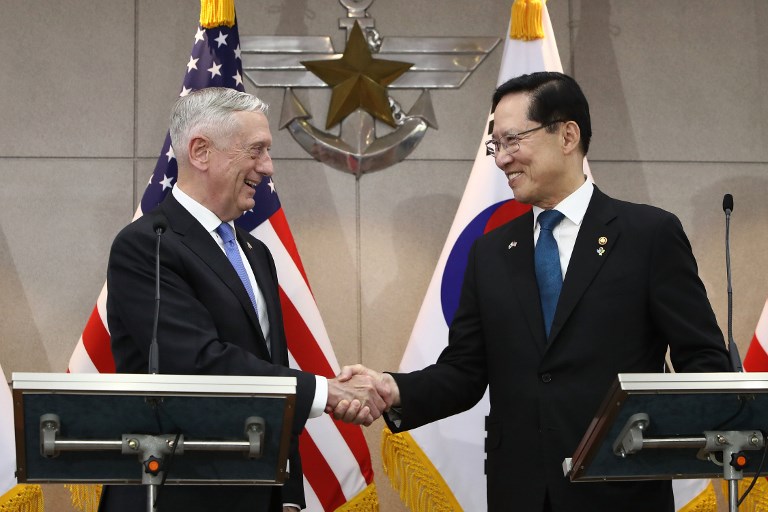
by Paul Handley
© Agence France-Presse
SEOUL, South Korea (AFP) — US Defense Secretary James Mattis told South Korea Thursday that their alliance remained “ironclad”, as he sought to reassure key East Asian allies following Donald Trump’s unilateral suspension of military exercises with Seoul.
Concern has mounted in the region over the stance of the US president, who has lauded North Korean leader Kim Jong Un as a “talented guy” as he seeks to persuade Pyongyang to give up its nuclear weapons.
But Mattis told his counterpart in Seoul: “The US commitment to the Republic of Korea remains ironclad,” adding that included “maintaining the current US force levels on the Korean peninsula”.
Mattis was flying to Tokyo later Thursday night for a day of meetings with senior Japanese officials.
Both South Korea and Japan have security alliances with the US guaranteed by treaty, but have been thrown off-balance by Trump’s quick moves on negotiations with Kim.
Most striking of all, at a press conference after the two men’s summit in Singapore earlier this month, Trump announced he would suspend joint military exercises with the South — with Seoul indicating that it was not informed beforehand.
US and South Korean forces have trained together for decades, and always characterised the drills as defensive in nature, while Pyongyang condemned them as rehearsals for invasion and often responded with provocations of its own.
Trump lamented the exercises’ cost and adopted the North’s description to call them “provocative”, adding that at some point, “I want to bring our soldiers back home.”
In Seoul Mattis said the suspension of August’s large-scale Ulchi Freedom Guardian improved opportunities for diplomatic negotiations, thereby “increasing prospects for a peaceful solution on the peninsula”.
The US has publicly maintained its commitment to protect Japan and South Korea — both of which host tens of thousands of US troops — from Kim’s nuclear-armed military.
But according to James Schoff, a former Pentagon Asia specialist now at the Carnegie Asia programme, “They are increasingly concerned and worried about the reliability of our reassurances.
“There is hypersensitivity now to any decision we make.”
Mattis arrived in Seoul from Beijing, where he questioned the militarisation of the South China Sea and President Xi Jinping stiffly defended his country’s claim to the disputed region.
“The US maintains an enduring commitment to a peaceful, secure and prosperous, free and open Indo-Pacific,” the Pentagon chief said Thursday.
Wild card
In Singapore, Kim signed a document committing the North to “work toward complete denuclearization of the Korean Peninsula” — a vague term open to interpretation on both sides, and critics said the declaration lacked substance and specifics.
Pyongyang has made no public commitment to give up its weapons, and satellite pictures have shown improvement works carrying on at its Yongbyon nuclear research facility.
But Trump has said the process of denuclearisation has already begun and the North no longer presents a nuclear threat.
The status of the North Korea talks, which are led by Secretary of State Mike Pompeo from the US side, remains unclear. What he and Trump might be willing to cede in terms of the US military presence on the Korean peninsula to obtain concessions from Kim is a closely held secret.
But Pompeo in a recent CNN interview seemed to tamp down on expectations of a deal soon — though he and other senior officials recently hinted that an outline of tasks for North Korea and a timeline was almost close to completion.
In both Japan and South Korea — which are within reach of the North’s proven short- and medium-range ballistic missiles — concern has been expressed that Washington could agree a deal that removed the threat against the US mainland, such as the North giving up its ICBMS, while leaving them squarely in Pyongyang’s firing line.
But Mattis has the respect of his counterparts in both countries, who trust him to understand their interests and honour US commitments.
“It would be relatively easy for Mattis to reassure Japan about worst-case scenarios,” said Schoff.
“In part that’s what Mattis and his counterparts in Korea and Japan want to sort out — what are our operational bottom lines, and can we agree on certain things.”
However, Schoff noted, Trump’s way of working is a constant wild card.
“Mattis clearly realises there are some elements that he may not be able to control” in the relationship, he added.
© Agence France-Presse







